
Oncology in Clinical Practice
Scope & Guideline
Navigating the Landscape of Cancer Treatment
Introduction
Aims and Scopes
- Clinical Oncology Research:
The journal publishes original research that addresses clinical challenges in oncology, including treatment efficacy, side effects, and patient management strategies. - Innovative Therapeutic Approaches:
There is a consistent focus on novel therapeutic strategies, including immunotherapy, targeted therapy, and combination treatments, reflecting the latest advancements in cancer treatment. - Multidisciplinary Management:
Papers often explore the multidisciplinary approach to cancer care, emphasizing collaboration among oncologists, surgeons, radiologists, and supportive care teams to improve patient outcomes. - Prognostic and Predictive Biomarkers:
The journal highlights research on biomarkers that can predict treatment response and prognosis, aiding in personalized medicine for cancer patients. - Psychosocial Aspects of Cancer Care:
There is a focus on the psychological and social dimensions of cancer treatment, including quality of life assessments and the impact of cancer on patients and families.
Trending and Emerging
- Immunotherapy and Checkpoint Inhibitors:
Recent publications increasingly focus on the use of immunotherapy, particularly checkpoint inhibitors, as a standard treatment modality for various cancers, showcasing their effectiveness and novel applications. - Digital Health and Oncology:
There is a growing interest in the integration of digital health tools, such as mobile applications and telemedicine, to enhance patient management and treatment adherence in oncology. - Precision Medicine and Genomics:
Emerging studies emphasize the role of genetic profiling and targeted therapies, indicating a shift towards personalized treatment plans based on individual patient characteristics. - Psychosocial Interventions:
An increased focus on the psychosocial aspects of cancer treatment, including stress management and quality of life improvements, reflects a holistic approach to patient care. - Artificial Intelligence in Oncology:
Recent trends show an interest in utilizing artificial intelligence for diagnostic and treatment planning purposes, indicating a technological advancement in oncology practice.
Declining or Waning
- Traditional Chemotherapy Protocols:
There is a noticeable reduction in publications specifically focused on traditional chemotherapy regimens, as the field shifts towards personalized medicine and targeted therapies. - Basic Science Research:
Research that primarily focuses on basic science or laboratory studies is less prevalent, with a stronger emphasis now on clinical applications and outcomes. - Epidemiological Studies:
While epidemiological research is still relevant, there has been a decrease in studies purely focused on cancer incidence and prevalence, as the journal prioritizes interventions and treatment strategies.
Similar Journals

JOURNAL OF CANCER RESEARCH AND CLINICAL ONCOLOGY
Elevating Clinical Oncology through Rigorous Scholarship.JOURNAL OF CANCER RESEARCH AND CLINICAL ONCOLOGY, published by Springer, is a prestigious peer-reviewed journal dedicated to advancing the fields of cancer research and clinical oncology. With an impact factor reflecting its significance within the academic community, the journal operates under a rigorous quality standard and offers a wealth of knowledge spanning from 1979 and continuing through 2025. With its comprehensive scope, it encompasses a wide array of topics including novel therapeutic strategies, clinical trials, and cutting-edge research methodologies, making it an essential resource for researchers, practitioners, and students alike. The journal’s category quartiles highlight its competitive edge, ranking Q2 in Cancer Research and Q1 in Medicine (miscellaneous) as of 2023. This positioning underscores its role at the forefront of oncology discourse. Through this journal, contributors and readers alike engage with impactful research that informs clinical practices and enhances patient care in oncology. Access to the journal’s content, although not open access, ensures curated and high-quality insights available to the academic and professional community.

Tumori Journal
Exploring New Frontiers in Cancer Treatment and Research.Tumori Journal is a distinguished publication in the field of oncology, dedicated to advancing the understanding and treatment of cancer since its inception in 1946. Published by SAGE Publications Ltd, this Italian journal serves as a pivotal platform for researchers, clinicians, and academicians to disseminate cutting-edge findings in cancer research and related areas of medicine. With an impressive record of contributions spanning multiple decades, Tumori Journal aims to foster collaboration and dialogue among professionals in the oncology community. Although classified in the Q4 category for Cancer Research and the Q3 category for both Medicine (miscellaneous) and Oncology as of 2023, the journal continues to draw interest with its rigorous peer-review process and commitment to quality. Researchers are encouraged to explore innovative methodologies and share impactful clinical insights through the journal, which also ranks within the top tiers of Scopus metrics for oncology and cancer research domains. With a growing emphasis on accessible research, Tumori Journal remains an essential resource in the continuous fight against cancer.
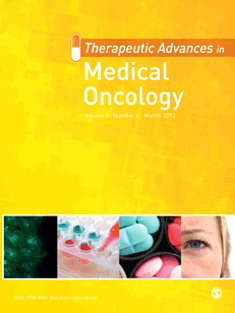
Therapeutic Advances in Medical Oncology
Pioneering open access to vital oncology research.Therapeutic Advances in Medical Oncology, an esteemed journal published by SAGE Publications Ltd, serves as a critical platform for disseminating high-quality research pertinent to the field of oncology. Indexed under the ISSN 1758-8340 and E-ISSN 1758-8359, this Open Access journal has made significant strides since its inception in 2009, attaining a commendable rank of #78 out of 404 in the Medicine - Oncology category of Scopus, placing it in the top 20th percentile of journals. With its category quartile of Q1 established in 2023, it underscores the journal’s commitment to advancing therapeutic approaches in oncology, making it an invaluable resource for researchers, clinicians, and students alike. Offering unrestricted access to pioneering studies since 2017, it aligns with the global movement towards open science, fostering collaboration and innovation among professionals striving to improve cancer treatment outcomes. By bridging the gap between research and clinical practice, Therapeutic Advances in Medical Oncology plays a vital role in shaping the future of cancer therapy.
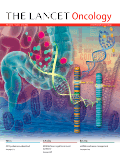
LANCET ONCOLOGY
Transforming the landscape of cancer treatment and prevention.The Lancet Oncology is a premier peer-reviewed journal published by Elsevier Science Inc., recognized as a leading authority in the field of oncology. With an ISSN of 1470-2045 and E-ISSN 1474-5488, this esteemed journal boasts an impressive 2023 impact factor placing it in the Q1 category of oncology—reflecting its role as a critical resource for cutting-edge research. The journal publishes high-quality articles covering novel scientific discoveries, clinical advancements, and public health issues related to cancer treatment and prevention. It is ranked #5 out of 404 in the Scopus Medicine _ Oncology category, demonstrating its influence and relevance in the field, with an outstanding rank in the 98th percentile. Operating from its base in the United Kingdom, The Lancet Oncology spans a comprehensive timeframe from 2000 to 2024, making it a vital repository of oncology literature. Although it does not primarily operate on an open-access model, its significant subscription base ensures that a wealth of knowledge is accessible to researchers, professionals, and students alike, fostering a profound understanding and advancement in oncology.
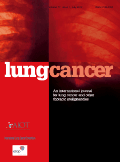
LUNG CANCER
Empowering Research, Enhancing LivesLUNG CANCER, published by Elsevier Ireland Ltd, is a pivotal academic journal dedicated to advancing knowledge in the fields of Cancer Research, Oncology, and Pulmonary and Respiratory Medicine. With an impressive impact factor reflected by its Q1 ranking across three key categories for 2023, this journal occupies a prestigious position within the research community, emphasizing quality and significance in published works. Since its inception in 1985, LUNG CANCER has provided a comprehensive platform for researchers and clinicians to disseminate findings and novel insights, enhancing the understanding and treatment of lung cancer. The journal stands out with Scopus rankings, placing it in the top percentile across multiple relevant fields, including a notable rank of #20 in Pulmonary and Respiratory Medicine. By fostering collaboration among scholars, the journal aims to facilitate innovative research and promote evidence-based practices that could transform patient outcomes. As such, LUNG CANCER is an essential resource for those navigating this complex area of study, from seasoned researchers to aspiring professionals.
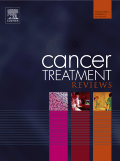
CANCER TREATMENT REVIEWS
Advancing oncology through comprehensive insights.Cancer Treatment Reviews, published by Elsevier Science Ltd, is a leading international journal dedicated to the exploration and advancement of therapeutic strategies in oncology. With an impressive impact factor that reflects its status in the field, this journal is classified within Q1 quartile rankings in Medicine (Miscellaneous), Oncology, and Radiology, Nuclear Medicine and Imaging, as of 2023. The journal has a rich lineage, having been established in 1974 and consistently evolving to encompass the latest breakthroughs and methodologies in cancer treatment. A vital resource for researchers, clinicians, and students alike, it aims to promote understanding and application of effective interventions, thereby contributing to improvements in patient outcomes. By prioritizing high-quality reviews, Cancer Treatment Reviews plays an essential role in bridging the gap between current research and clinical practice, making it an indispensable asset in the continuous fight against cancer.
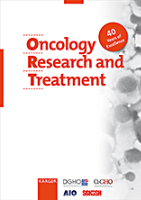
Oncology Research and Treatment
Advancing cancer care through innovative research.Oncology Research and Treatment, published by KARGER, is a highly regarded academic journal dedicated to advancing the field of oncology through rigorous research and clinical insights. With a history spanning from 1978 to 1997 and continuing from 2013 to 2024, this journal provides a vital platform for researchers and professionals in cancer research, hematology, and related disciplines. Though currently listed in the Q3 tier of 2023 for Cancer Research, Hematology, and Oncology, its growing readership and open access policy enhance its visibility and impact within the scientific community. Based in Switzerland, the journal features diverse access options, reflecting the global importance of oncology research. With a focus on innovative treatments and the latest methodologies, Oncology Research and Treatment plays a crucial role in fostering collaboration and dialogue among researchers, professionals, and students alike, helping to shape the future of cancer care and management.

World Journal of Clinical Oncology
Empowering Oncology with Cutting-Edge InsightsWorld Journal of Clinical Oncology, published by BAISHIDENG PUBLISHING GROUP INC, stands as a vital resource in the realm of oncology, providing a dedicated platform for the dissemination of cutting-edge research and clinical advancements. With an ISSN of 2218-4333, this journal facilitates a comprehensive exploration of modern oncology challenges and breakthroughs, targeting researchers, healthcare professionals, and students alike. Although it operates under the traditional subscription model, the impactful nature of its content is reflected in its notable ranking of 60 out of 334 in the category of Medicine _ Oncology, placing it in the 82nd percentile among peer publications. Covering significant topics in clinical oncology from 2014 to 2018, the journal has been instrumental in addressing evolving oncology practices and patient care innovations. By publishing high-quality studies, it remains an essential tool for advancing knowledge and fostering collaboration within the global oncology community.
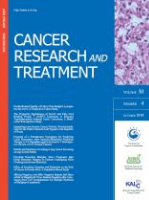
Cancer Research and Treatment
Leading the charge in cancer research and innovation.Cancer Research and Treatment is a premier academic journal published by the Korean Cancer Association that focuses on advancing scientific knowledge and clinical practices in the fields of cancer research and oncology. With an ISSN of 1598-2998 and an E-ISSN of 2005-9256, the journal showcases cutting-edge research articles, clinical trials, and comprehensive reviews that address the multifaceted challenges in cancer treatment and management. Published in South Korea, this journal has established itself as a critical resource, evidenced by its Q1 rank in Oncology and Q2 rank in Cancer Research, reflecting its influence and stature within the academic community. The impact of research disseminated through Cancer Research and Treatment is underscored by its significant percentile rankings in Scopus, with notable positions in both the pharmaceutical and biological sectors. This journal aims to bridge the gap between laboratory research and clinical application, providing a platform for researchers, healthcare professionals, and students to enhance their understanding of cancer-related innovations and therapeutic strategies. Readers will benefit from rich content that not only discusses the latest advancements but also engages with pressing global health issues related to cancer.

BRITISH JOURNAL OF CANCER
Elevating the Standards of Cancer Research.The British Journal of Cancer, published by SpringerNature, stands as a preeminent resource in the fields of Cancer Research and Oncology, with a distinguished history of publication dating back to 1947. With its Q1 rank in both categories for 2023, this journal is among the top-tier publications, offering cutting-edge research and insights into the biology, etiology, and treatment of cancer. The journal’s rigorous peer-review process ensures that readers are presented with high-quality studies that contribute to the advancement of cancer knowledge and clinical practice. Operating from the United Kingdom, it has garnered a notable impact factor and ranks impressively within Scopus, making it an essential publication for researchers, healthcare professionals, and students who are dedicated to understanding cancer's complexities. Access to the journal's articles is available in traditional formats, providing a versatile platform for disseminating pivotal research. As we move towards a future where cancer treatment and prevention remain crucial, the British Journal of Cancer continues to play a vital role in shaping the dialogue and discoveries within the oncology community.